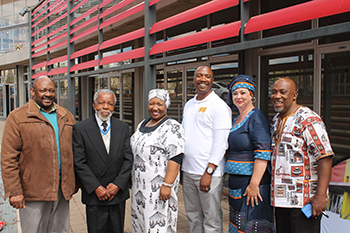
The Macufe Wordfest attracted language practitioners from
the Free State and Eastern Cape Province. From the left are:
Dr Elias Malete (UFS: African Languages),
Prof Johannes Malefetsane Lenake (honoured guest),
Nthabiseng Naketsana (Eastern Cape: Head of
Provincial Languages Services), Shoaneng Sefali
(Chairperson: Free State Writers Forum), Mariaan Otto
(Language Practitioner at FS government) and
Dr Mathene Abram Mahanke (Free State: Head of Provincial
Languages Services). Photo: Jóhann Thormählen
The University of the Free State (UFS) has a responsibility to advance good stakeholder relationships with public and government entities by creating opportunities for collaborative projects. According to Dr Elias Malete, Senior Lecturer and Academic Head at the Department of African Languages, this is why it is important for the UFS to be involved in projects such as Macufe Wordfest.
His department and the UFS Library, in collaboration with the Provincial Languages Services, hosted Wordfest on the Bloemfontein Campus as part of the Mangaung Cultural Festival. He says the main focus of the word festival, held from 4-6 October 2017 in the Economic and Management Sciences Auditorium, was to bring together literary practitioners from the Free State and Eastern Cape.
Prof Malefetsane Lenake honoured
“In this festival, budding authors have a platform to read their works to fellow practitioners, seasoned authors use their experience and expertise to assist budding and aspiring authors, and published authors have the opportunity to launch their new books,” says Dr Malete.
Highlights included the recognition of longstanding, retired academic, Prof Johannes Malefetsane Lenake, for his contribution to the development of Sesotho, and the awarding of trophies to learners who wrote excellent essays in Sesotho, Setswana, isiXhosa and isiZulu about the life of OR Tambo.
First African Languages Writers Day
On 30 August 2017 various Sesotho writers’ organisations gathered at the UFS Sasol Library to celebrate the first African Languages Writers Day. It was hosted by Department of African Languages and the UFS library and mapped a way forward on ways to promote African Languages recognised by the Free State language policy.
The goal was to promote and preserve African languages, unearth writers, share ideas, and help to shape the future. Dr Malete says such events are important to ensure that UFS “is a people-centred institution where the educational and developmental needs of local communities are catered for”.